×
Il semble que vous utilisiez une version obsolète de internet explorer. Internet explorer n'est plus supporté par Microsoft depuis fin 2015. Nous vous invitons à utiliser un navigateur plus récent tel que Firefox, Google Chrome ou Microsoft Edge.

Devenez membre d'Incathlab et bénéficiez d'un accès complet !
Vous devez être membre pour accéder aux vidéos Incathlab sans limitation. Inscrivez vous gratuitement en moins d'une minute et accédez à tous les services Incathlab ! Vous avez aussi la possibilité de vous connecter directement avec votre compte facebook ou twitter en cliquant sur login en haut à droite du site.
Inscription Connexion
Inscription Connexion
25037 vues
Complex coronary interventions will be performed in Kantonsspital, St Gallen (Switzerland) by Dr Daniel Weilenmann.
Around an interactive discussion with Dr Stéphane Rinfret from Montreal (Canada), both Experts will review these video cases in a step-by-step approach, observing the chosen strategy depending on patients datas and indications, analysing the devices selection, commenting the management of complications, and concluding with the quality of results.
Program
| 13:00 | Introduction |
| 13:05 |
Case in box n°1: Complex PCI in MVD (Rotablator) Panel Discussion |
| 13:25 |
Case in box n°2: CTO of mid RCA Panel Discussion |
| 13:45 |
Case in box n°3: LAD PCI with a self apposing stent Panel Discussion |
| 14:05 |
Case in box n°4: In stent CTO post CTO PCI mid RCA Panel Discussion |
| 14:25 | Take home messages |
Cases in box: Clinical Data
-
Case in box n°1: Complex PCI in MVD (Rotablator)
- Male, 78 years old
-
No CAD known
-
Since 3 weeks angina pectoris CCS II
-
No concomitant diseases known
-
CVRF: hypertension, dyslipidemia
-
11.9.17 admitted for NSTEMI with intermittent angina
-
CAG 11.9.17: very calcified vessels, proximal LAD 50.70%, eccentric, mid LAD 95% (culprit lesion), CX proximal 50%, marginal 80%, RCA with severe stenosis ostial stenosis, mid RCA with severe stenosis
-
Echo: normal, LVEF 65%; mild aortic stenosis
-
Renal function: eGFR = 55 ml/min/1.73m2
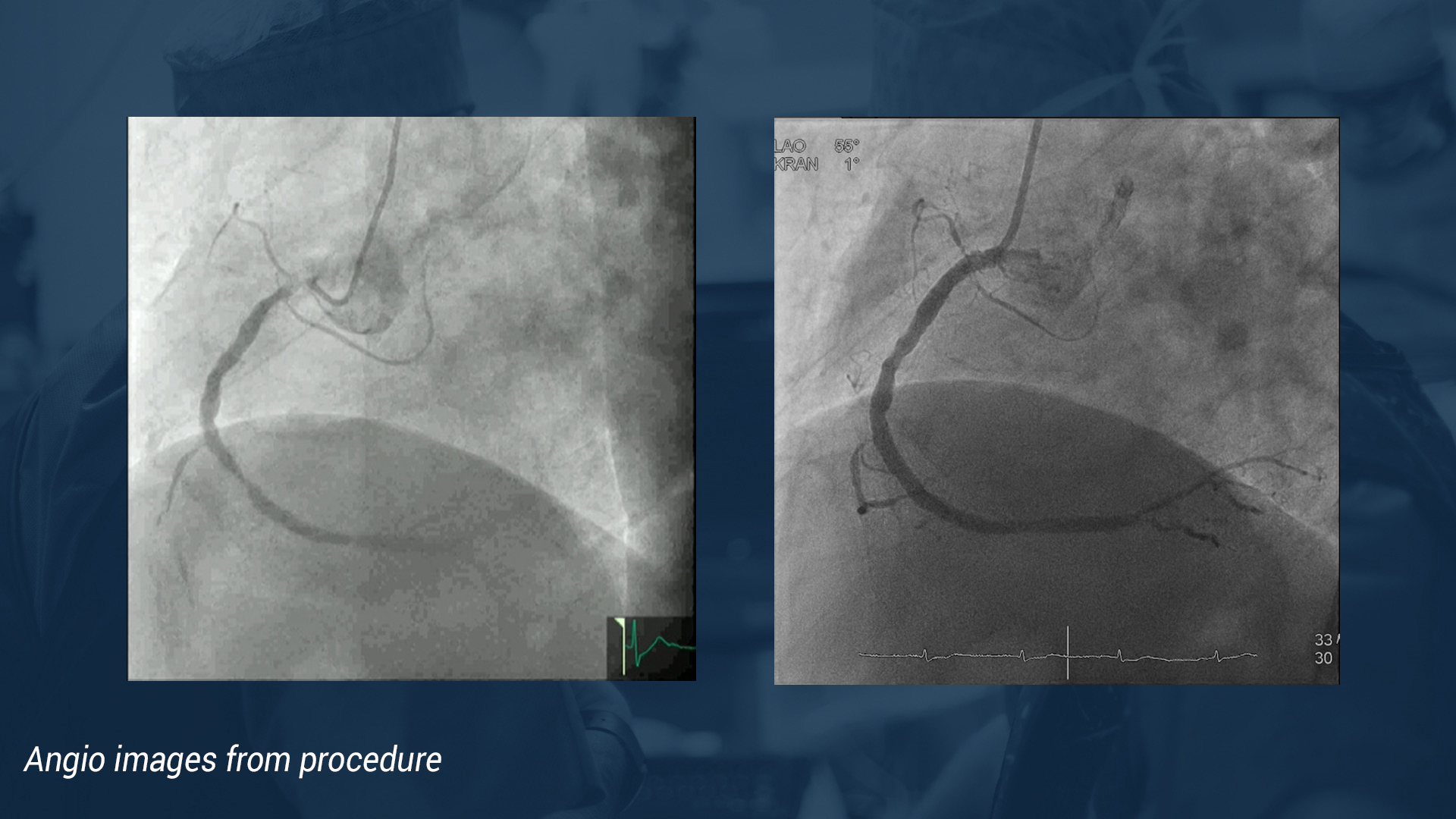
-
Case in box n°2: CTO of mid RCA
- Male, 62 years old
-
No CAD known
-
Check up showed a pathologic ECG, asymptomatic
-
Cardiologist found a slight inferior hypokinesia
-
Stresstest: significant ST depression, no angina
-
No concomitant diseases known
-
CVRF: smoker (70py), hypertension, dyslipidemia, family history
-
Sent for CAG
-
CAG 24.8.17:proximal LAD 50%, D1 and D2 50%, CX without stenosis, dominant with occlusion of the mid part
-
J-CTO score: 1
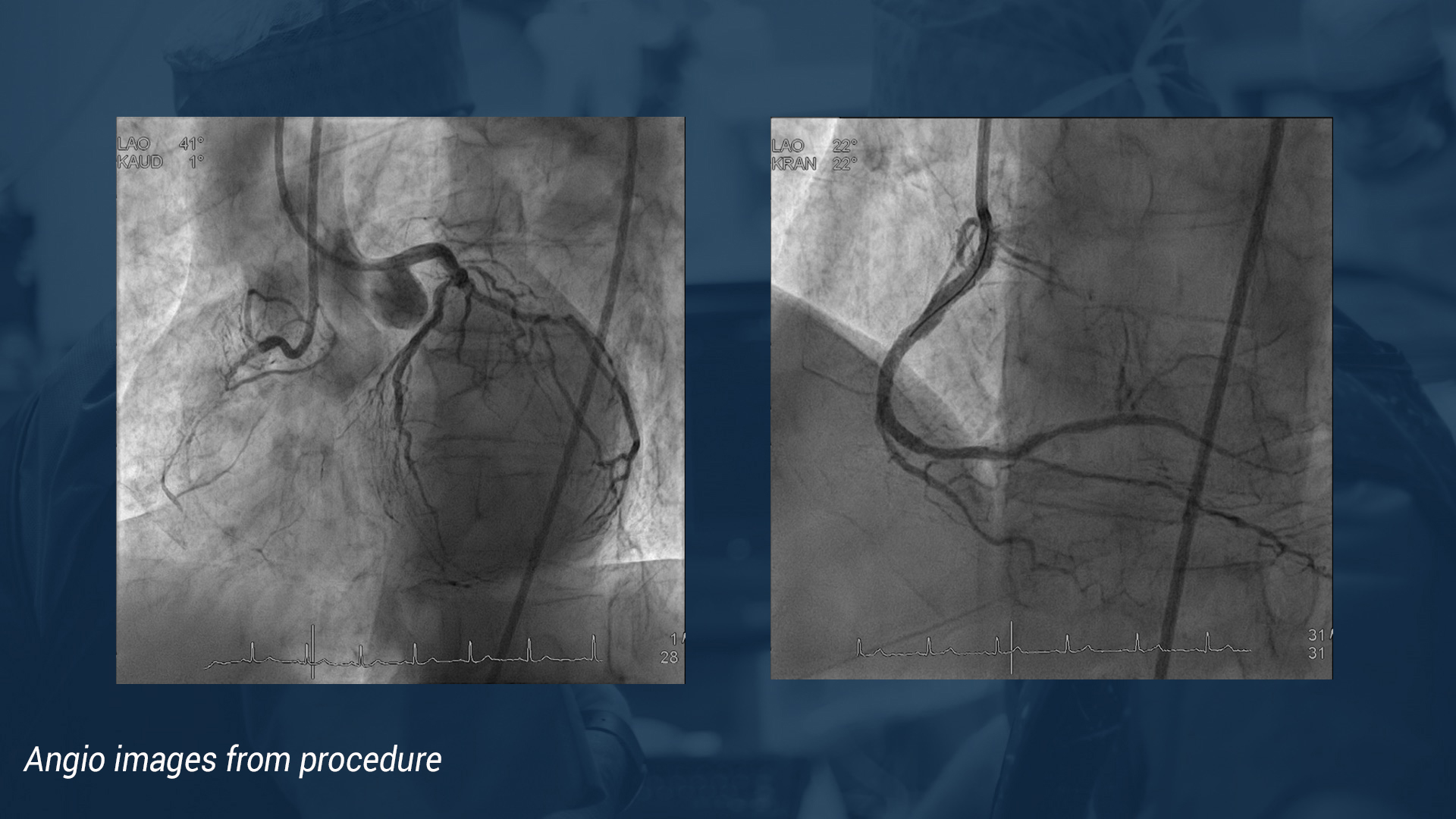
-
Case in box n°3: LAD PCI with a self apposing stent
- Male, 44 years old
- No CAD known
- Since 3 weeks angina, in the last days clas IIII
- T-inversions in the V1-V6
- Echo: normal LVEF 65%, inor regional dysfunction
- CVRF: family history, dyslipidemia, former smoker
- Renal function: eGFR =>90 ml/min/1.73m2
-
CAG: tight stenosis of the proximal LAD, intermediate stenosis of mid LAD, intermediate stenosis of the CX
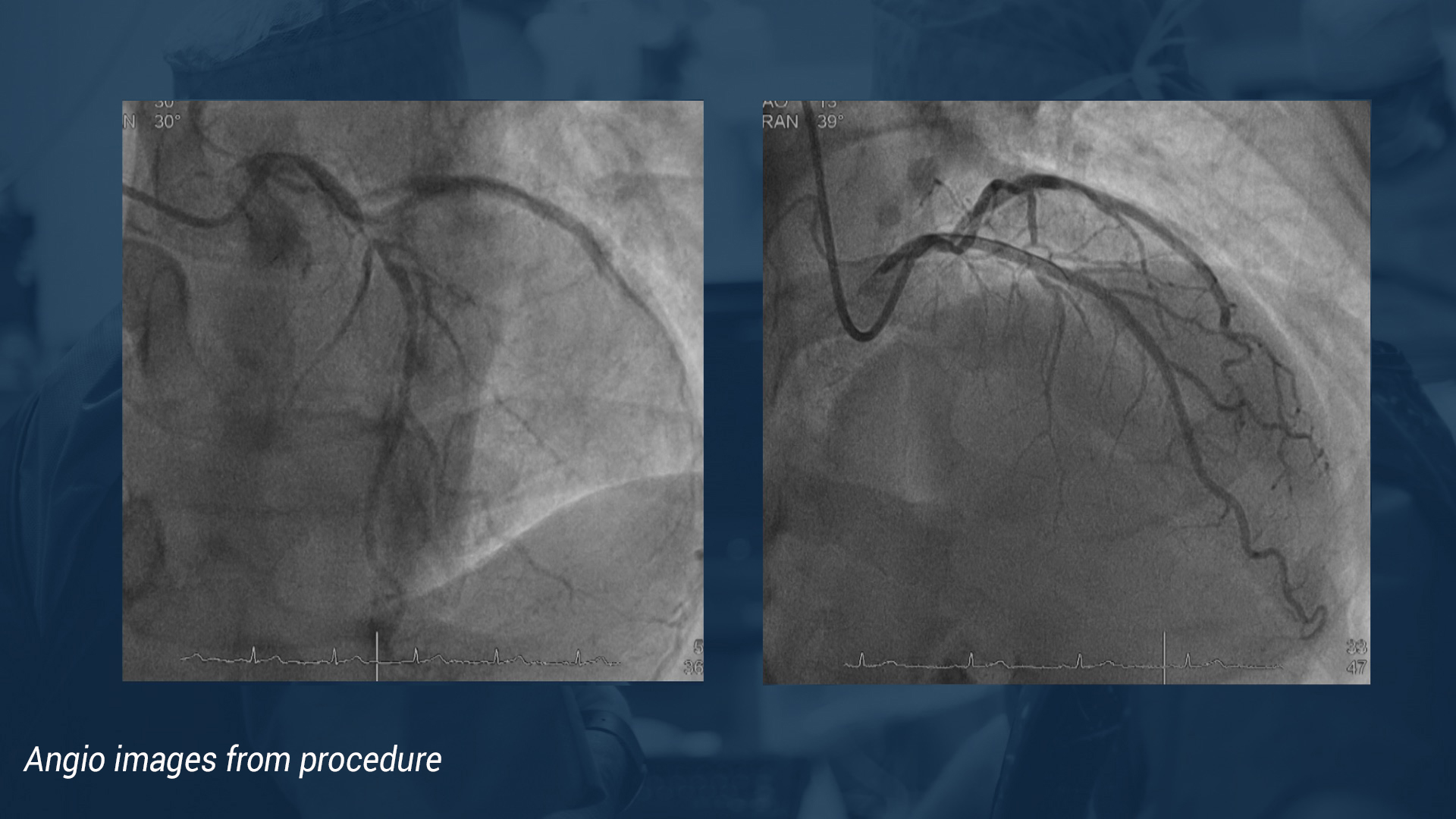
-
Case in box n°4: In stent CTO post CTO PCI mid RCA
- Male, 54 years old
-
2005 CTO PCI of the RCA with DES
-
2011 CTO PCI of the LAD with DES
-
Asymptomatic for several years
-
No concomitant diseases known
-
CVRF: former smoker (10py), hypertension, dyslipidemia, IDDM
-
Echo: LVEF 65%, normal
-
MRI: Normal LVEF, full viability, large inferior ischemia
-
Renal function: eGFR = 93 ml/min/1.73m2
-
Since 3 months angina pectoris CCS II
-
SPECT with inferior ischemia. Sent for CAG
-
CAG 5.9.17: LAD 50% with good result in DES, CX without stenosis, in-stent reocclusion of the RCA
-
J-CTO score: 1
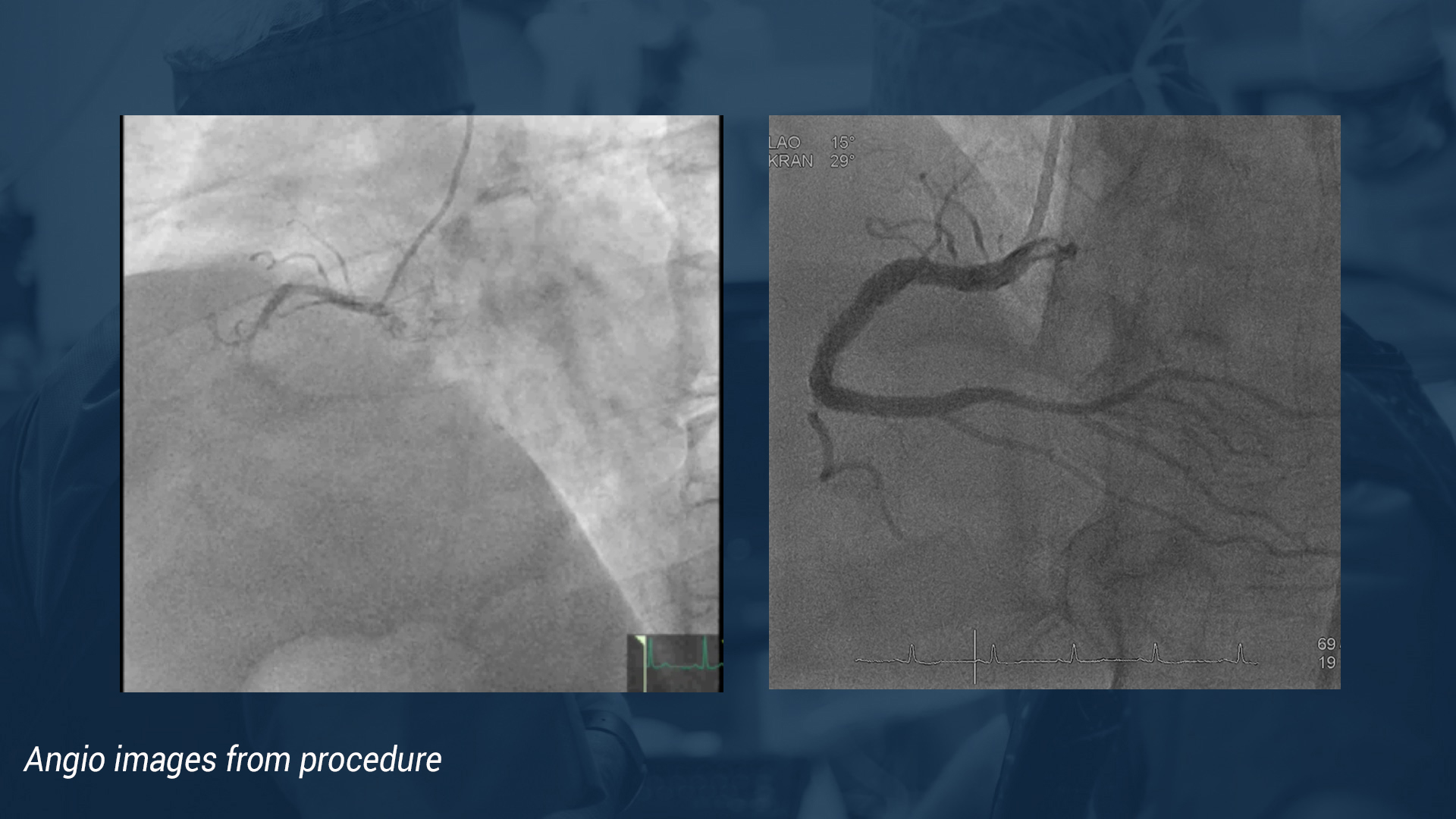
Educational objectives
- Improve coronary angioplasty knowledge (techniques and approach strategies).
- Discuss the choice of a material.
- How to manage complications.
- Compare techniques and approach strategies of different experts.
Audience
- This web symposium is dedicated to interventional cardiologists interested and/or specialized in coronary angioplasty.
- A prerequisite for attendees in an initial knowledge and practice of angioplasty.
Date du tournage : 14/09/2017
Dernière mise à jour : 03/08/2018
Dernière mise à jour : 03/08/2018
SeQuent® Please NEO / B. Braun
Next generation coronary Drug Coated Balloon to treat vascular stenosis
Xposition S Sirolimus Eluting Self Apposing® / STENTYS
Coronary Stent System
Participer à la discussion
Suggestions
Mercredi 5 juillet 2023 de 18h à 19h (GMT+2)
Honolulu : Mercredi 5 juillet 2023 de 07h à 08h (GMT+2)
San Francisco : Mercredi 5 juillet 2023 de 10h à 11h (GMT+2)
New York : Mercredi 5 juillet 2023 de 13h à 14h (GMT+2)
Buenos Aires : Mercredi 5 juillet 2023 de 14h à 15h (GMT+2)
Reykjavik : Mercredi 5 juillet 2023 de 17h à 18h (GMT+2)
London / Dublin : Mercredi 5 juillet 2023 de 18h à 19h (GMT+2)
Paris / Berlin : Mercredi 5 juillet 2023 de 19h à 20h (GMT+2)
Istanbul : Mercredi 5 juillet 2023 de 20h à 21h (GMT+2)
Moscou / Dubaï : Mercredi 5 juillet 2023 de 21h à 22h (GMT+2)
Bangkok : Jeudi 6 juillet 2023 de 00h à 01h (GMT+2)
Shanghai : Jeudi 6 juillet 2023 de 01h à 02h (GMT+2)
Tokyo : Jeudi 6 juillet 2023 de 02h à 03h (GMT+2)
Sydney : Jeudi 6 juillet 2023 de 04h à 05h (GMT+2)
Wellington : Jeudi 6 juillet 2023 de 06h à 07h (GMT+2)
San Francisco : Mercredi 5 juillet 2023 de 10h à 11h (GMT+2)
New York : Mercredi 5 juillet 2023 de 13h à 14h (GMT+2)
Buenos Aires : Mercredi 5 juillet 2023 de 14h à 15h (GMT+2)
Reykjavik : Mercredi 5 juillet 2023 de 17h à 18h (GMT+2)
London / Dublin : Mercredi 5 juillet 2023 de 18h à 19h (GMT+2)
Paris / Berlin : Mercredi 5 juillet 2023 de 19h à 20h (GMT+2)
Istanbul : Mercredi 5 juillet 2023 de 20h à 21h (GMT+2)
Moscou / Dubaï : Mercredi 5 juillet 2023 de 21h à 22h (GMT+2)
Bangkok : Jeudi 6 juillet 2023 de 00h à 01h (GMT+2)
Shanghai : Jeudi 6 juillet 2023 de 01h à 02h (GMT+2)
Tokyo : Jeudi 6 juillet 2023 de 02h à 03h (GMT+2)
Sydney : Jeudi 6 juillet 2023 de 04h à 05h (GMT+2)
Wellington : Jeudi 6 juillet 2023 de 06h à 07h (GMT+2)
Left Main and Bifurcation treatment:
impact of clinical trials in daily practice
Partager
Upcoming, Wednesday 28th February
Where is my guidewire? Only IVUS knows - A story about an ambiguous RCA proximal cap
Alex & The Young Generation - Ep.10
Partager
Lundi 10 juin 2024 de 17h à 18h (GMT+2)
Honolulu : Lundi 10 juin 2024 de 06h à 07h (GMT+2)
San Francisco : Lundi 10 juin 2024 de 09h à 10h (GMT+2)
New York : Lundi 10 juin 2024 de 12h à 13h (GMT+2)
Buenos Aires : Lundi 10 juin 2024 de 13h à 14h (GMT+2)
Reykjavik : Lundi 10 juin 2024 de 16h à 17h (GMT+2)
London / Dublin : Lundi 10 juin 2024 de 17h à 18h (GMT+2)
Paris / Berlin : Lundi 10 juin 2024 de 18h à 19h (GMT+2)
Istanbul : Lundi 10 juin 2024 de 19h à 20h (GMT+2)
Moscou / Dubaï : Lundi 10 juin 2024 de 20h à 21h (GMT+2)
Bangkok : Lundi 10 juin 2024 de 23h à 00h (GMT+2)
Shanghai : Mardi 11 juin 2024 de 00h à 01h (GMT+2)
Tokyo : Mardi 11 juin 2024 de 01h à 02h (GMT+2)
Sydney : Mardi 11 juin 2024 de 03h à 04h (GMT+2)
Wellington : Mardi 11 juin 2024 de 05h à 06h (GMT+2)
San Francisco : Lundi 10 juin 2024 de 09h à 10h (GMT+2)
New York : Lundi 10 juin 2024 de 12h à 13h (GMT+2)
Buenos Aires : Lundi 10 juin 2024 de 13h à 14h (GMT+2)
Reykjavik : Lundi 10 juin 2024 de 16h à 17h (GMT+2)
London / Dublin : Lundi 10 juin 2024 de 17h à 18h (GMT+2)
Paris / Berlin : Lundi 10 juin 2024 de 18h à 19h (GMT+2)
Istanbul : Lundi 10 juin 2024 de 19h à 20h (GMT+2)
Moscou / Dubaï : Lundi 10 juin 2024 de 20h à 21h (GMT+2)
Bangkok : Lundi 10 juin 2024 de 23h à 00h (GMT+2)
Shanghai : Mardi 11 juin 2024 de 00h à 01h (GMT+2)
Tokyo : Mardi 11 juin 2024 de 01h à 02h (GMT+2)
Sydney : Mardi 11 juin 2024 de 03h à 04h (GMT+2)
Wellington : Mardi 11 juin 2024 de 05h à 06h (GMT+2)
L’OCT dans la resténose et thrombose de stent – il est temps d’allumer la lumière !
L’imagerie : un outil indispensable pour gérer les complications post-angioplastie
Partager
Mardi 6 décembre 2022 de 17h à 18h (GMT+1)
Honolulu : Mardi 6 décembre 2022 de 06h à 07h (GMT+1)
San Francisco : Mardi 6 décembre 2022 de 08h à 09h (GMT+1)
New York : Mardi 6 décembre 2022 de 11h à 12h (GMT+1)
Buenos Aires : Mardi 6 décembre 2022 de 13h à 14h (GMT+1)
London / Dublin : Mardi 6 décembre 2022 de 16h à 17h (GMT+1)
Paris / Berlin : Mardi 6 décembre 2022 de 17h à 18h (GMT+1)
Istanbul : Mardi 6 décembre 2022 de 18h à 19h (GMT+1)
Moscou / Dubaï : Mardi 6 décembre 2022 de 20h à 21h (GMT+1)
Bangkok : Mardi 6 décembre 2022 de 23h à 00h (GMT+1)
Shanghai : Mercredi 7 décembre 2022 de 00h à 01h (GMT+1)
Tokyo : Mercredi 7 décembre 2022 de 01h à 02h (GMT+1)
Sydney : Mercredi 7 décembre 2022 de 02h à 03h (GMT+1)
Wellington : Mercredi 7 décembre 2022 de 04h à 05h (GMT+1)
San Francisco : Mardi 6 décembre 2022 de 08h à 09h (GMT+1)
New York : Mardi 6 décembre 2022 de 11h à 12h (GMT+1)
Buenos Aires : Mardi 6 décembre 2022 de 13h à 14h (GMT+1)
London / Dublin : Mardi 6 décembre 2022 de 16h à 17h (GMT+1)
Paris / Berlin : Mardi 6 décembre 2022 de 17h à 18h (GMT+1)
Istanbul : Mardi 6 décembre 2022 de 18h à 19h (GMT+1)
Moscou / Dubaï : Mardi 6 décembre 2022 de 20h à 21h (GMT+1)
Bangkok : Mardi 6 décembre 2022 de 23h à 00h (GMT+1)
Shanghai : Mercredi 7 décembre 2022 de 00h à 01h (GMT+1)
Tokyo : Mercredi 7 décembre 2022 de 01h à 02h (GMT+1)
Sydney : Mercredi 7 décembre 2022 de 02h à 03h (GMT+1)
Wellington : Mercredi 7 décembre 2022 de 04h à 05h (GMT+1)
Bifurcation PCI, when finishing with one or two stents is not obvious
Partager
Jeudi 9 octobre 2025 de 12h à 13h (GMT+2)
Honolulu : Jeudi 9 octobre 2025 de 01h à 02h (GMT+2)
San Francisco : Jeudi 9 octobre 2025 de 04h à 05h (GMT+2)
New York : Jeudi 9 octobre 2025 de 07h à 08h (GMT+2)
Buenos Aires : Jeudi 9 octobre 2025 de 08h à 09h (GMT+2)
Reykjavik : Jeudi 9 octobre 2025 de 11h à 12h (GMT+2)
London / Dublin : Jeudi 9 octobre 2025 de 12h à 13h (GMT+2)
Paris / Berlin : Jeudi 9 octobre 2025 de 13h à 14h (GMT+2)
Istanbul : Jeudi 9 octobre 2025 de 14h à 15h (GMT+2)
Moscou / Dubaï : Jeudi 9 octobre 2025 de 15h à 16h (GMT+2)
Bangkok : Jeudi 9 octobre 2025 de 18h à 19h (GMT+2)
Shanghai : Jeudi 9 octobre 2025 de 19h à 20h (GMT+2)
Tokyo : Jeudi 9 octobre 2025 de 20h à 21h (GMT+2)
Sydney : Jeudi 9 octobre 2025 de 22h à 23h (GMT+2)
Wellington : Vendredi 10 octobre 2025 de 00h à 01h (GMT+2)
San Francisco : Jeudi 9 octobre 2025 de 04h à 05h (GMT+2)
New York : Jeudi 9 octobre 2025 de 07h à 08h (GMT+2)
Buenos Aires : Jeudi 9 octobre 2025 de 08h à 09h (GMT+2)
Reykjavik : Jeudi 9 octobre 2025 de 11h à 12h (GMT+2)
London / Dublin : Jeudi 9 octobre 2025 de 12h à 13h (GMT+2)
Paris / Berlin : Jeudi 9 octobre 2025 de 13h à 14h (GMT+2)
Istanbul : Jeudi 9 octobre 2025 de 14h à 15h (GMT+2)
Moscou / Dubaï : Jeudi 9 octobre 2025 de 15h à 16h (GMT+2)
Bangkok : Jeudi 9 octobre 2025 de 18h à 19h (GMT+2)
Shanghai : Jeudi 9 octobre 2025 de 19h à 20h (GMT+2)
Tokyo : Jeudi 9 octobre 2025 de 20h à 21h (GMT+2)
Sydney : Jeudi 9 octobre 2025 de 22h à 23h (GMT+2)
Wellington : Vendredi 10 octobre 2025 de 00h à 01h (GMT+2)
RMS Freesolve:
Continuing the Journey and Discovering the Potential of Scaffolds
Partager
Discover it now!
Proximal RCA occlusion with ipsi and controlateral collateral
Alex & Friends - Ep.7
Partager

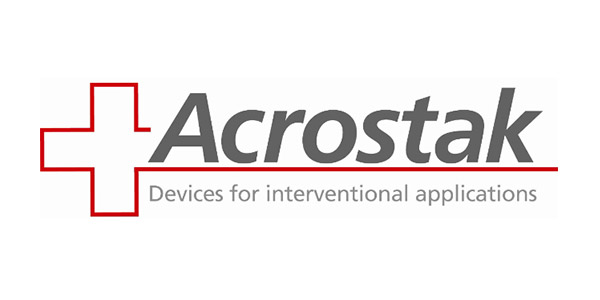
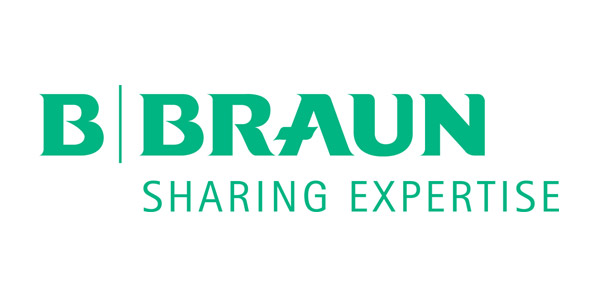

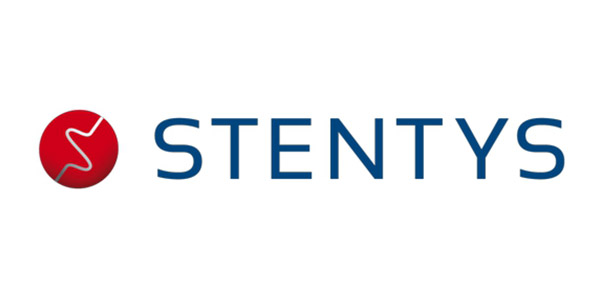
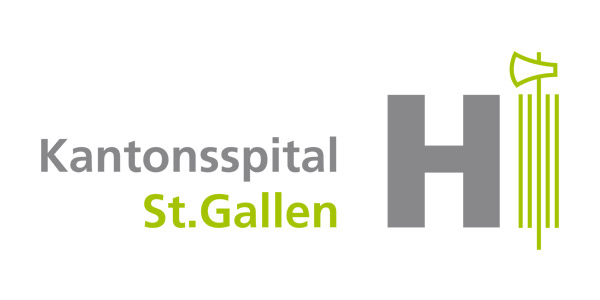
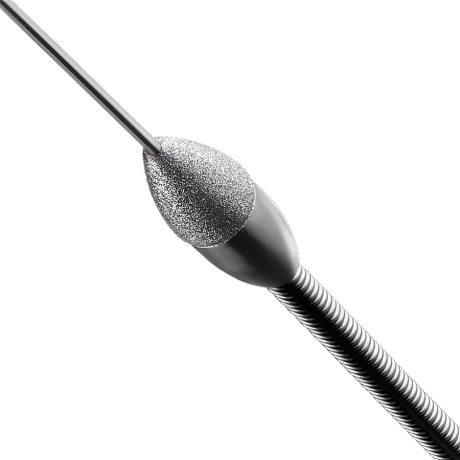
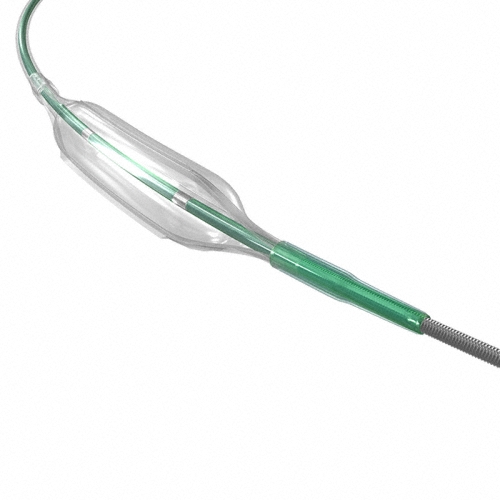
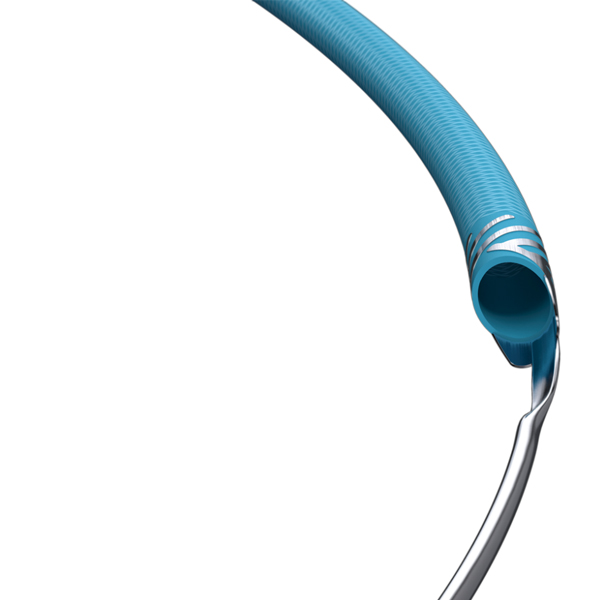
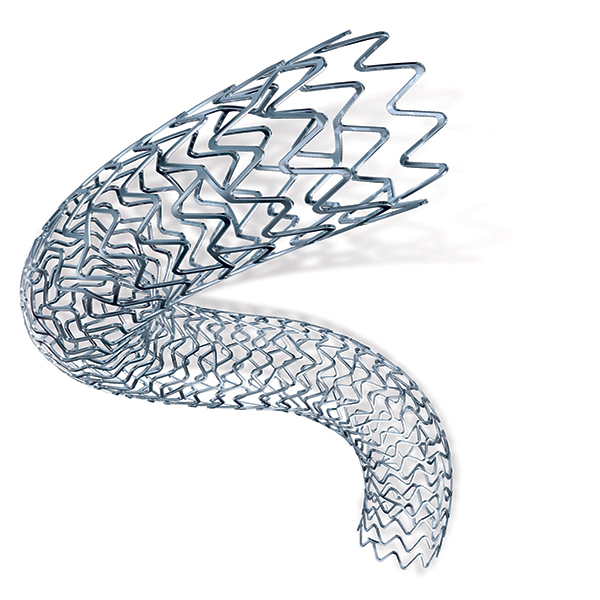
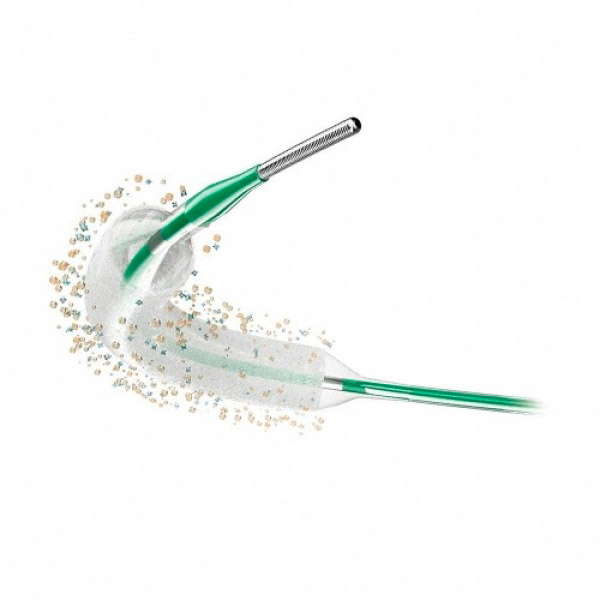
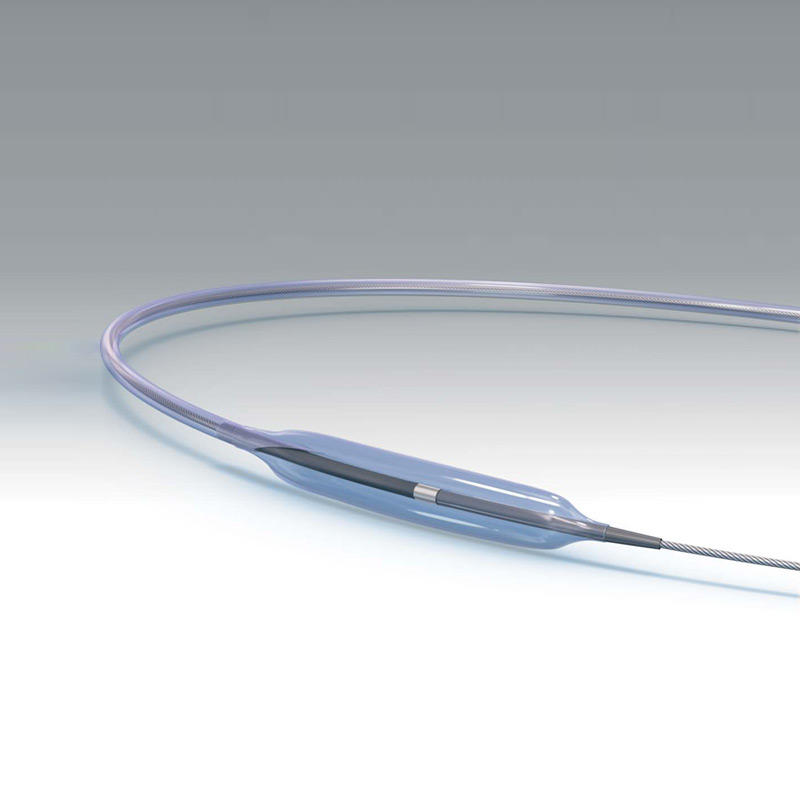
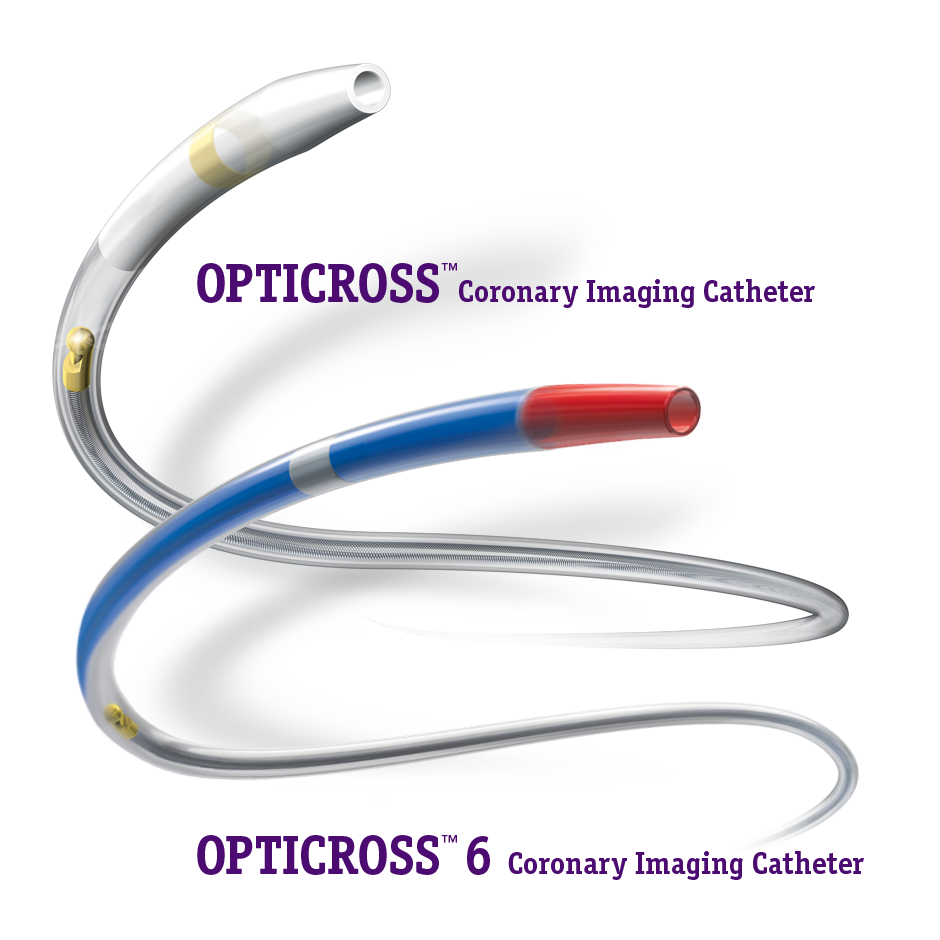
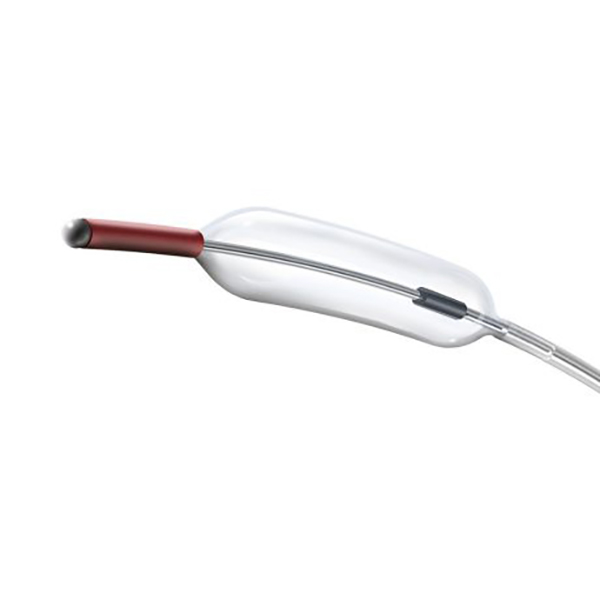
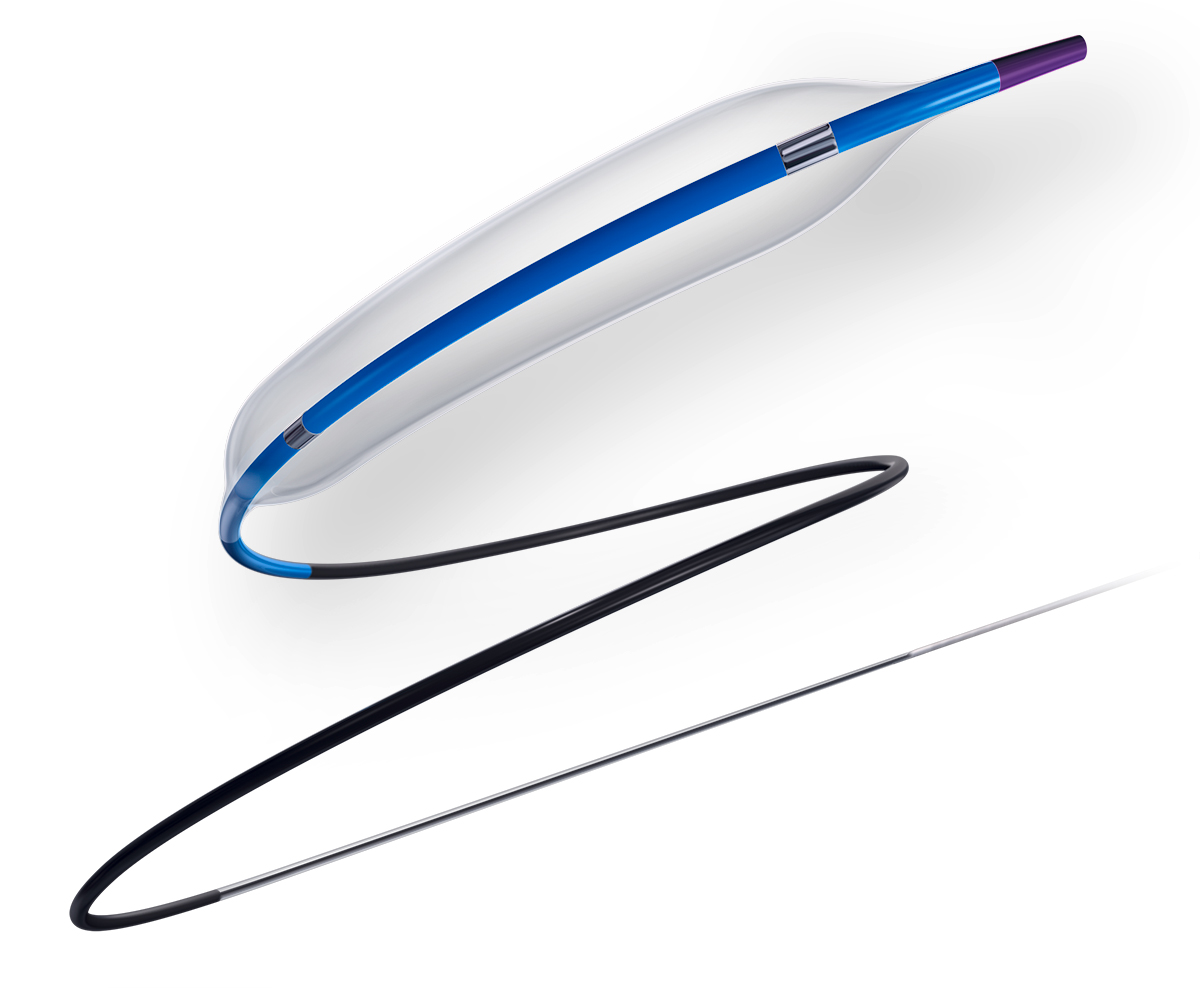
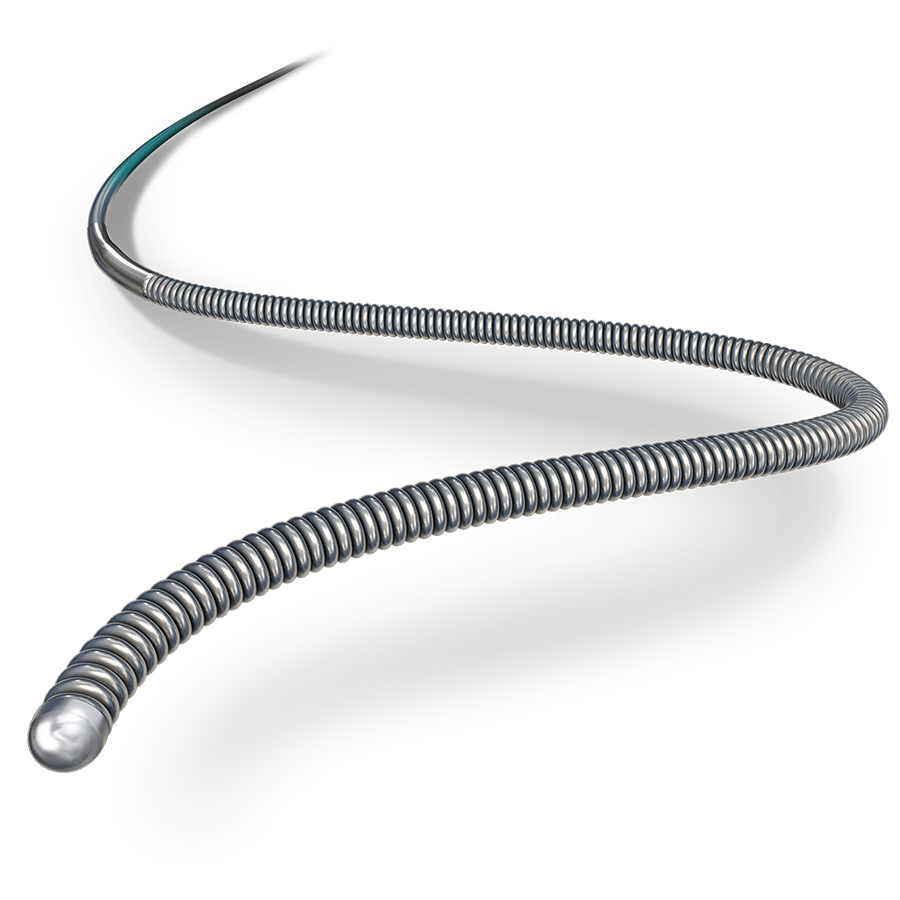
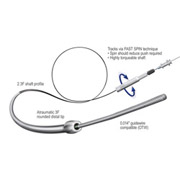

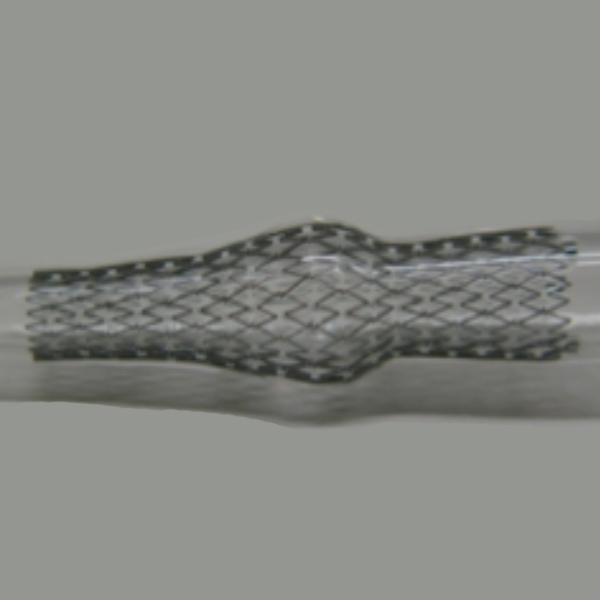
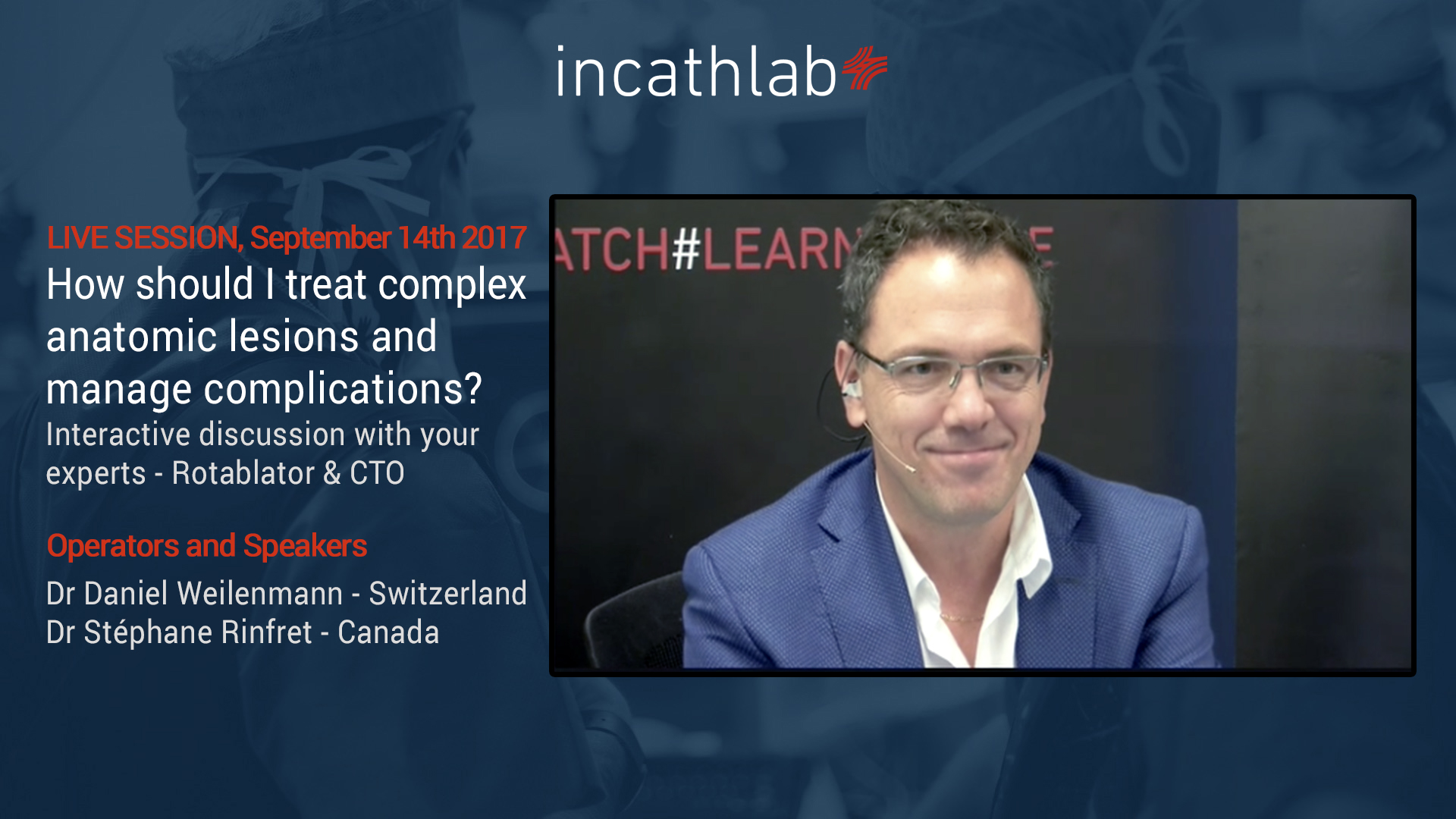
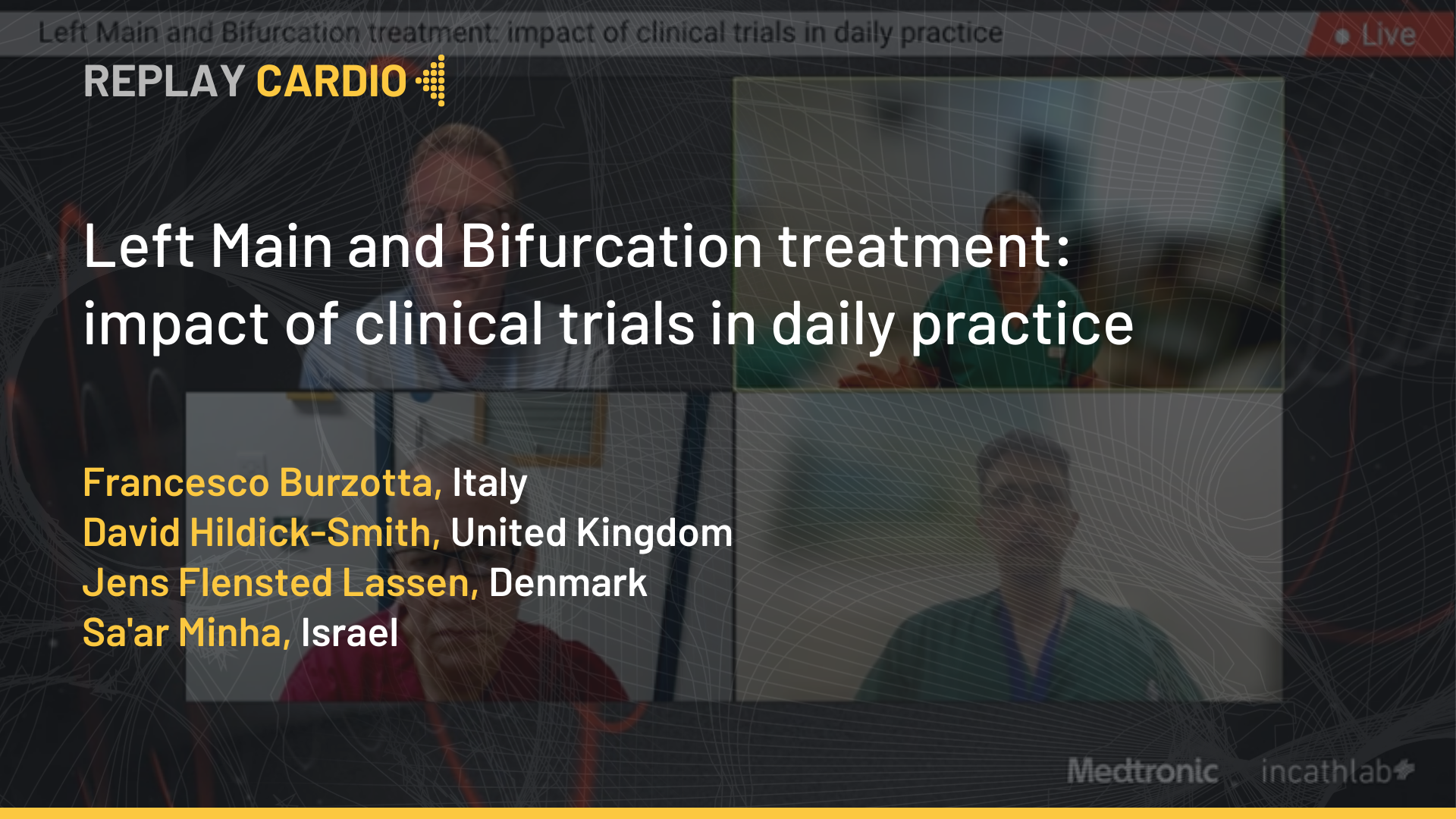
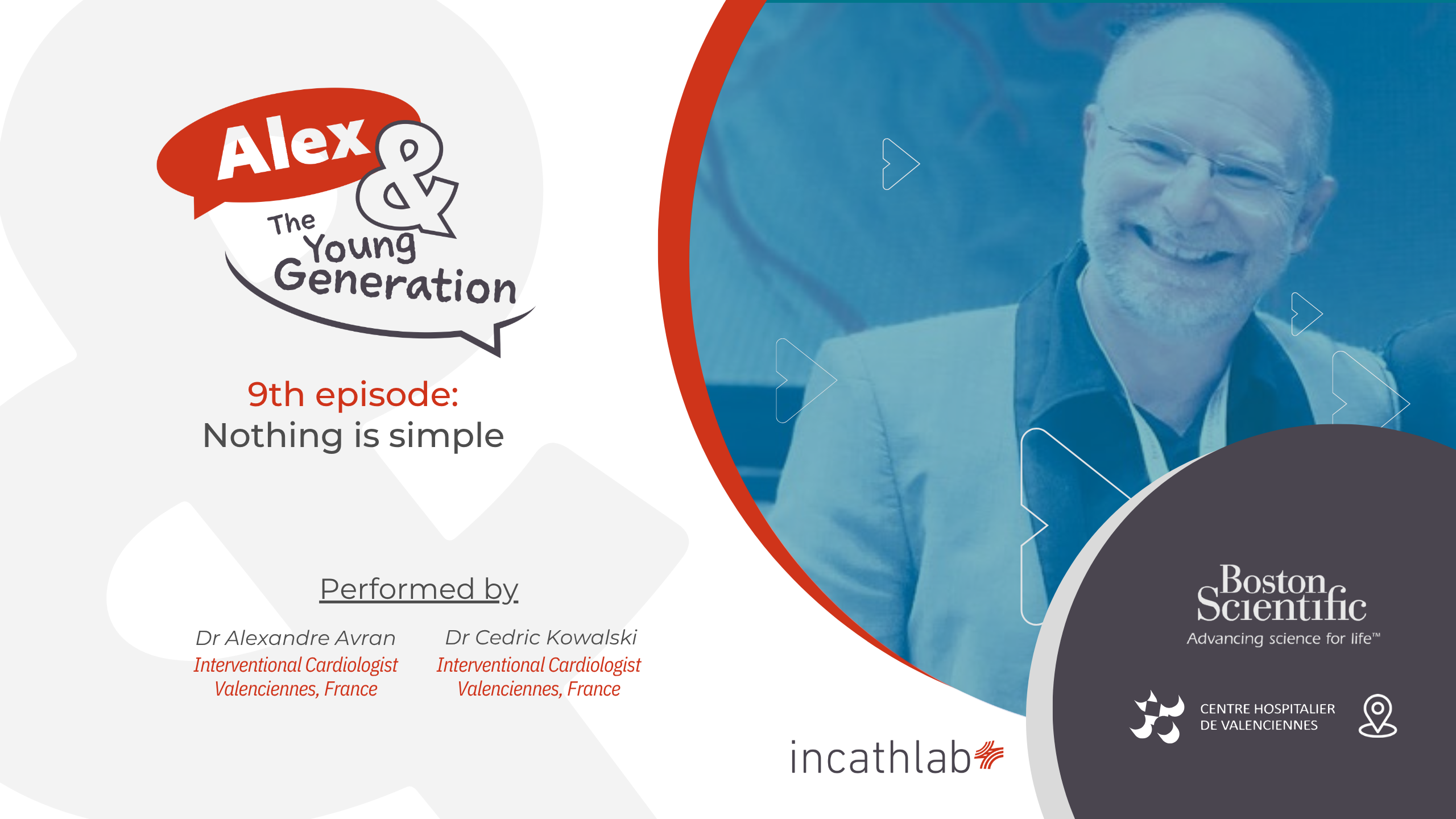
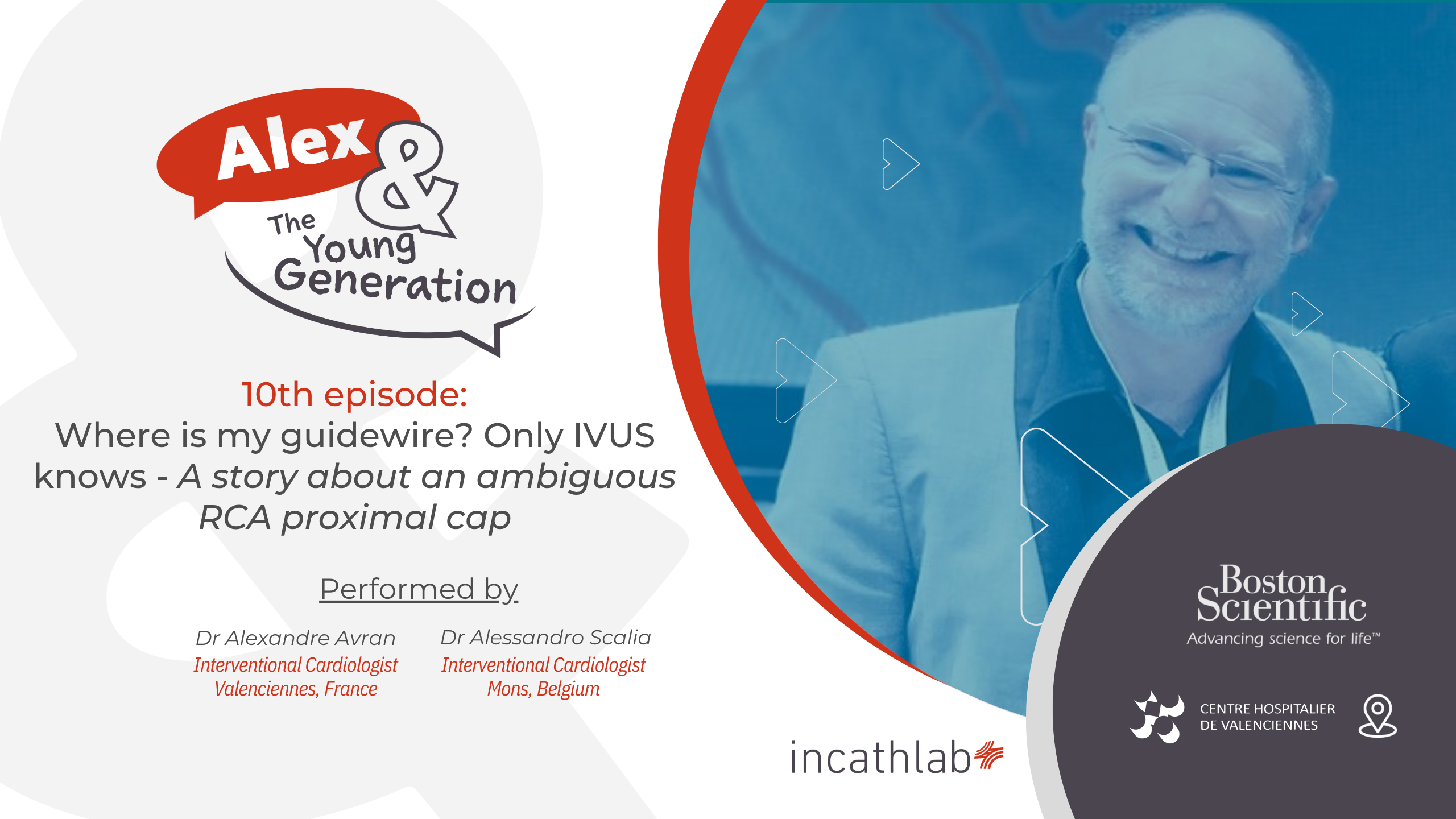
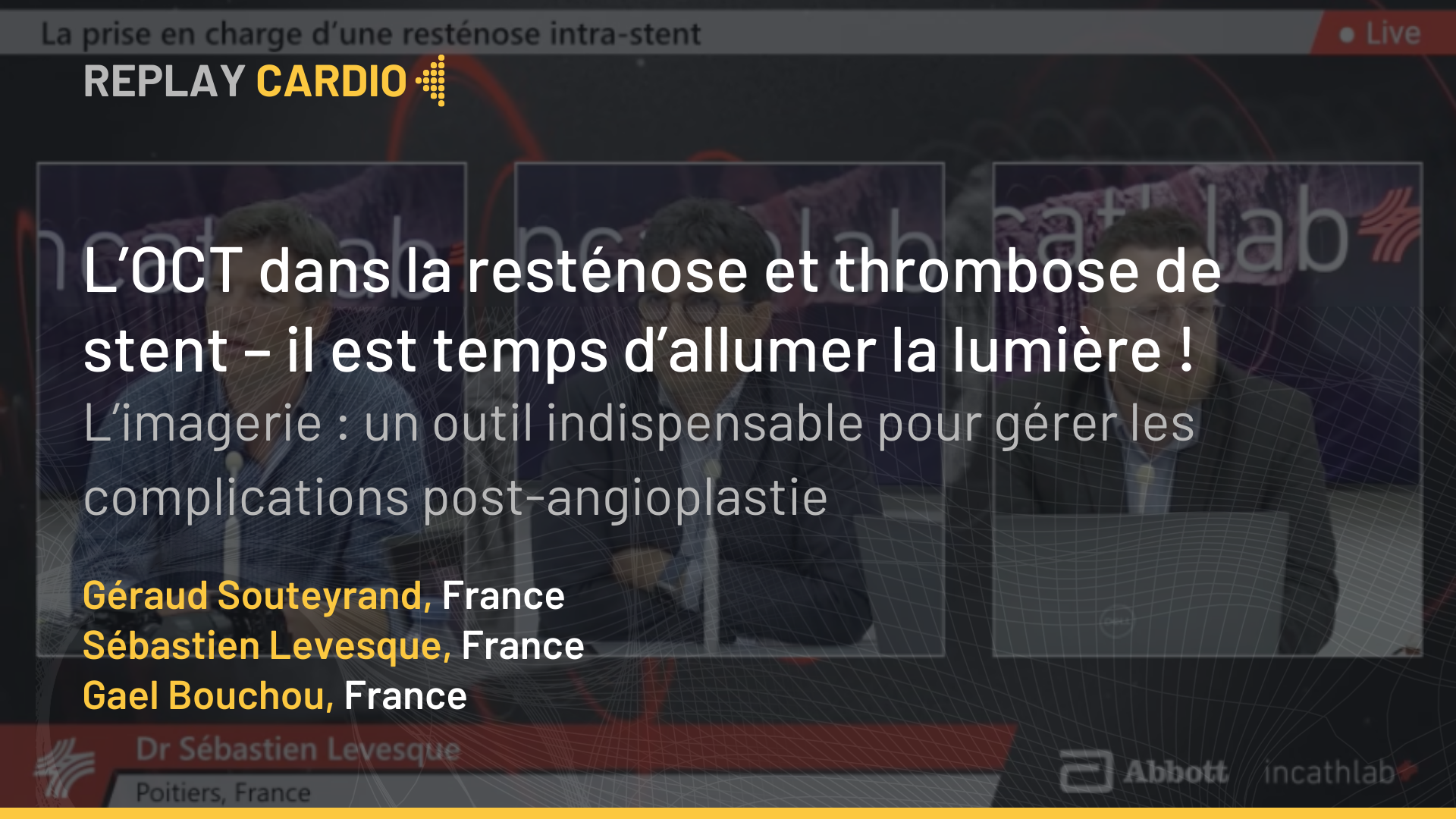
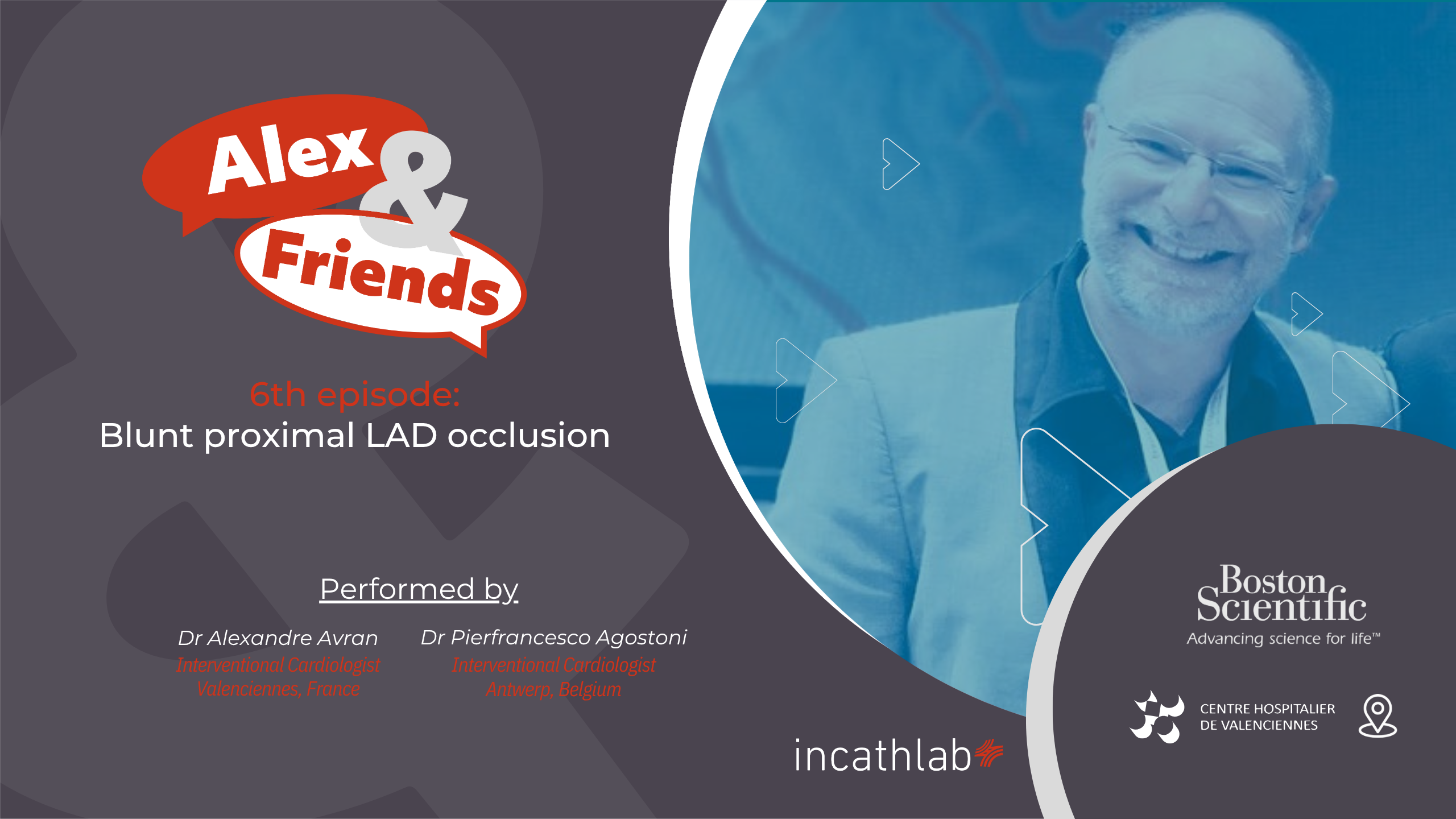
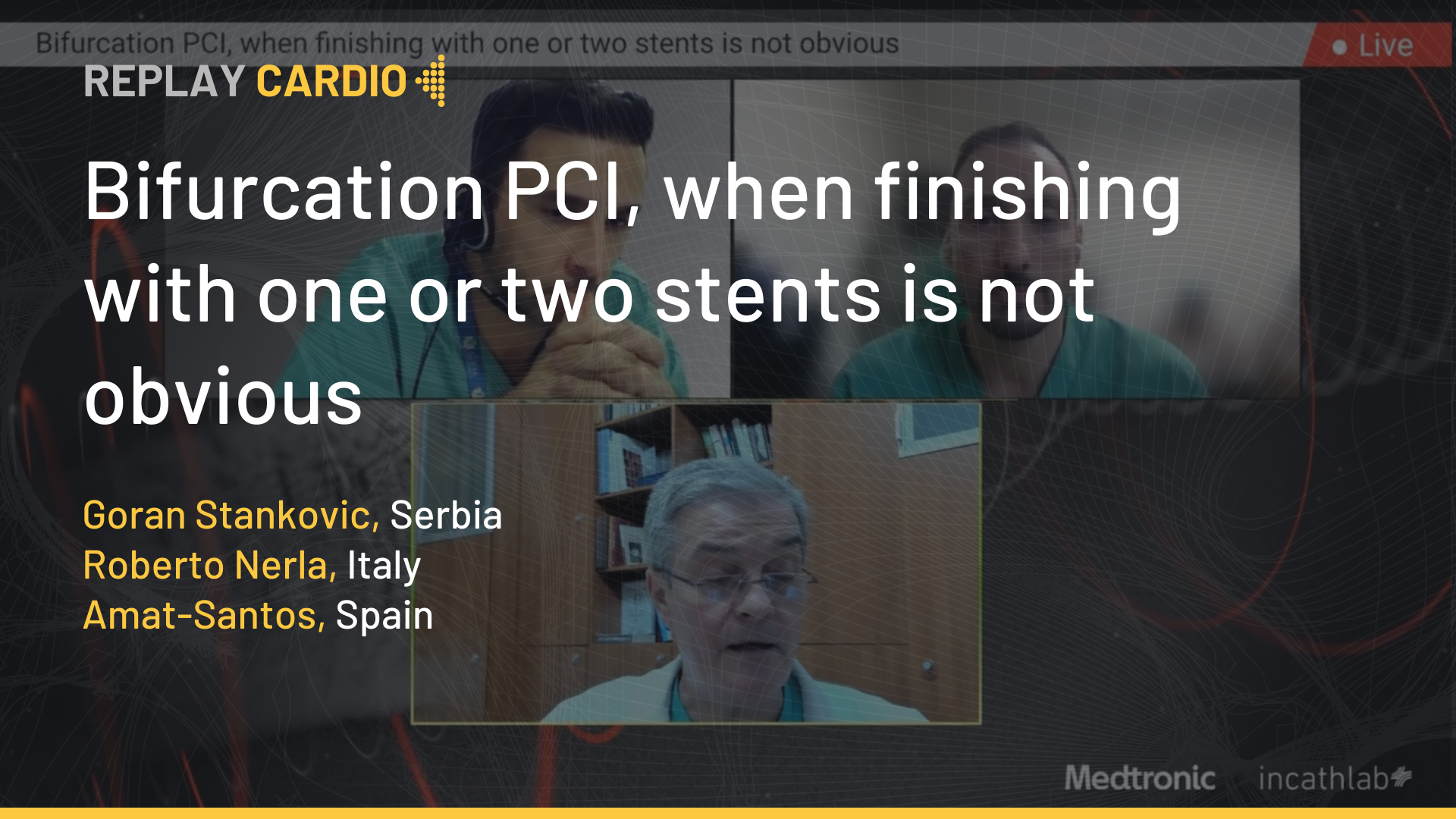

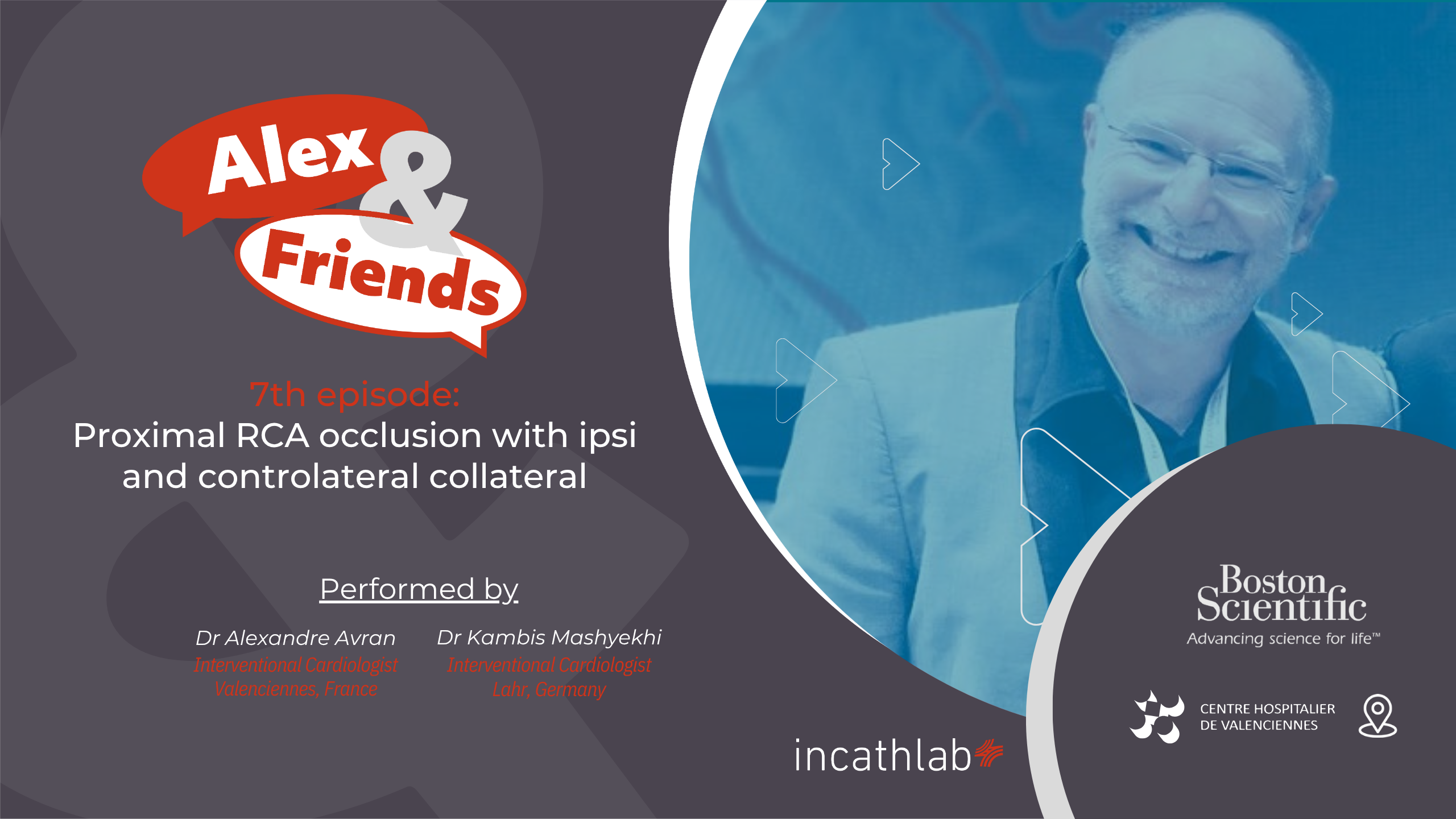
Lorenzo A. Hi guys. Do you usually perform IVUS after Rotablator, to assess for the need for additional plaque modification, or on the contrary to decide if a DEB is enough?
Obiora A. excellent
venkatesa reddy D. lots of teachings in case helped to clear doubts
R A. dear sir...
how do you manage highly eccentric stenosis especially wiring technique?
small curved tip.?
Daniel W. Great question! Well this can be very challenging. Basically the shape depends on the anaytomy. I personally do not use preshaped wires and shape my wire in relation to the anatomy. The type of wire can play a role too. Sometimes you choose also tapered polymeric wires.